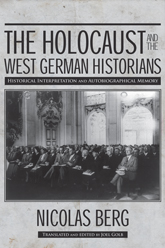The Holocaust and the West
German Historians
Historical Interpretation and Autobiographical Memory
Nicolas Berg
Translated and edited by Joel Golb
George L. Mosse Series in
Modern European Cultural
and Intellectual History
Steven E. Aschheim, Stanley G. Payne,
Mary Louise Roberts, and
David J. Sorkin, Series Editors
This landmark book was first published in Germany, provoking both acclaim
and controversy. In this “history of historiography,” Nicolas Berg addresses the
work of German and German-Jewish historians in the first three decades of post-World War II Germany. He examines how they perceived—and failed to perceive—the Holocaust and how they interpreted and misinterpreted that historical fact
using an arsenal of terms and concepts, arguments and explanations.
This English-language translation is also a shortened and reorganized edition,
which includes a new introduction by Berg reviewing and commenting on the
response to the German editions. Notably, in this American edition, discussion
of historian Joseph Wulf and his colleague and fellow Holocaust survivor Léon
Poliakov has been united in one chapter. And special care has been taken to make
clear to English speakers the questions raised about German historiographical
writing. Translator Joel Golb comments, “From 1945 to the present, the way
historians have approached the Holocaust has posed deep-reaching problems
regarding choice of language. . . . This book is consequently as much about language
as it is about facts.”
Nicolas Berg is a research fellow at the Simon Dubnow Institute and teaches in
the Department of History at the University of Leipzig. He is the author of several
books about Jews and anti-Semitism in Germany. Joel Golb is an independent editor and literary historian. He lives in Berlin.
Praise
“Scholars (including maybe graduate students) with a broader interest in the relationship between historiography and the dimensions of memory and biography will be grateful for this edition.”
—European History Quarterly
“As Berg skillfully demonstrates, historians are often guided or blinded by their own biases, particularly when they support a narrative of innocence or powerlessness in the face of radical evil.”
—Jewish Book Council
“A highly original, intelligent, and reflective piece of historical scholarship. One of the most important works to have appeared on the subject of postwar German historiography in the past decade.”
—Anthony Kauders, author of Democratization and the Jews
“An essential work for students of Holocaust historiography and West German history and a fascinating read for everyone interested in the historian’s craft. This American edition adds important new dimensions to the debate.”
—Adi Gordon, Amherst College
Publicity and Press Kit Resources
Click here for current & upcoming UW Press events
Download high resolution cover, color
Download high resolution cover, b/w
All images are at least 2.25 inches at 300 dpi wide; current title covers are a minimum of 1500 px wide/6 inches wide at 300 dpi. Please contact us if you need a custom size.
Media & bookseller inquiries regarding review copies, events, and interviews can be directed to the publicity department at publicity@uwpress.wisc.edu or (608) 263-0734. (If you want to examine a book for possible course use, please see our Course Books page. If you want to examine a book for possible rights licensing, please see Rights & Permissions.)
|

January 2015
LC: 2014007449 DD
346 pp. 6 x 9
4 b/w photos
• Original German edition: Wallstein Verlag, 2003
|

